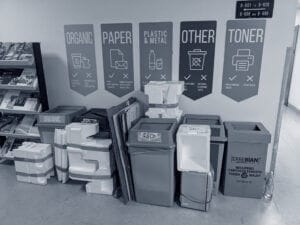Sustainable Banking
HIGHLIGHTS
Banks may lend money in deposit accounts to various corporations, including fossil fuel companies
- Switching to sustainable banks can reduce the funds available to the fossil fuel sector
- A behavioral lens can help address barriers to switching and support consumers’ environmental values
The Challenge
Seven in 10 people in the US now recognize that climate change is happening, and six in 10 believe that it is human-caused. But despite increasing concern surrounding climate change, it is difficult to align our own individual everyday decisions and actions to create positive impact—or avoid negative impact—on the environment. One area where many environmentally minded consumers don’t consider the impact of their behavior is personal banking.
In the United States, many of us have heard about sustainable investing, or choosing to buy stock in companies that are committed to positive social and environmental impact. But the money in deposit accounts—checking, savings, money market accounts, and certificates of deposit—also affects the world outside the bank vault. Banks leverage these deposits to make loans to various corporations, including fossil fuel companies. In fact, North American banks are the biggest lenders and underwriters of fossil fuel projects. Research suggests that merely continuing to use existing fossil fuel infrastructure until the end of its life imperils the Paris Agreement goal of limiting warming to 1.5ºC. Financing new fossil fuel exploration and infrastructure virtually ensures we will exceed that limit.
The opportunity is large: 93% of US households have a checking or savings account, while only 52% own stock. Focusing efforts only on sustainable investing not only excludes many people from the conversation, it creates a missed opportunity for environmentally minded consumers who want to use their daily decisions to support the environment. By switching our bank accounts to accounts that don’t finance fossil fuel projects, not only can we directly reduce the amount of funds available to the fossil fuel sector, but we can also increase funds for community and clean energy investment.
Our Approach
The Climate and Environment Team at ideas42 partnered with two sustainable financial institutions, Self-Help Federal Credit Union and Aspiration, to understand and encourage consumer demand for deposit accounts that fund socially and ecologically sustainable investments. We published a report documenting our findings and sharing behavioral insights for the benefit of all sustainable finance providers and stakeholders—and people who want to use their choices to help the environment. The report, Bank on What You Believe, includes an outline of the relationship between retail banks and the fossil fuel industry, an overview of the work we’ve done with our sustainable financial institution partners, and the main behavioral barriers preventing well-intentioned consumers from switching to sustainable bank accounts.
When it comes to switching to a sustainable banking option, we found that behavioral barriers fit into the following engagement areas:
- most consumers don’t recognize the links between where they keep their money and climate change (or aren’t aware of sustainable banking as an option),
- most consumers don’t consider their banking behavior as a means for social change, and
- many consumers don’t act to switch accounts even if they want to do so
To address barriers around recognition and consideration, we partnered with Purpose, Fernandez Advisors, Presente.org, Sol Nation, and Grow Brooklyn to launch Bank for Good, a consumer-facing effort to inform people about the existence of banks near them that would be suitable options for switching to sustainable deposit accounts. The website and campaign aim to make it clear to consumers what sustainable banking is, why it matters, and how to make the switch.
To address barriers around acting, we conducted a process audit for account switching, trying out the experience ourselves using a checklist of common behavioral barriers to identify opportunities for improvement. We identified quick wins through these audits that resulted in more users applying to open climate friendly accounts as well as depositing more money into them.
Takeaway
Going forward, we encourage our partners and other institutions to test interventions to help people overcome these barriers. A movement of consumers holds promise not only to demonstrate a moral and ethical standard for banks to uphold, but also to grow the business potential in the sustainable banking space—and the reputational risk of maintaining the status quo.
Consumers, sustainable financial institutions, and advocates will all have roles to play in mobilizing the financial sector away from fossil fuels and toward a clean and just economy. Along the way, we can discover and leverage behavioral strategies to help more people drive informed, values-based, empowered action in service of a better world for all.
Learn more about the Bank for Good campaign and website.
Read the report, Bank on What You Believe: Behavioral Insights to Accelerate the Adoption of Sustainable Bank Deposit Accounts.
Read the project brief, Process Audits Reduced Barriers to Joining Fossil-Free Financial Institutions.
Interested in learning more about our work applying behavioral science to the sustainable finance space? Reach out to us at sarah@ideas42.org or tweet at @ideas42 to join the conversation.









